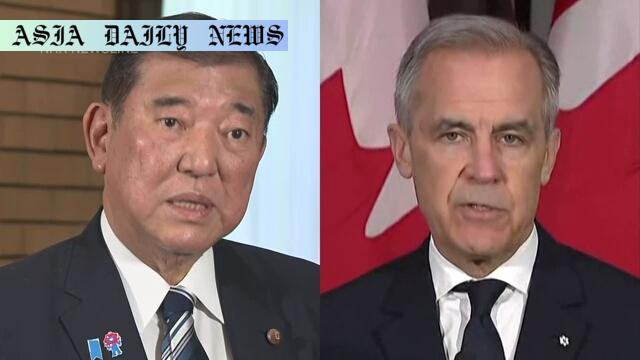Tariffs – Japan’s Prime Minister Ishiba Shigeru and Canadian PM Mark Carney discuss US tariffs and international cooperation opportunities.
Japan’s PM Ishiba and Canada’s PM Carney held a phone discussion on US tariffs.
The two leaders agreed on the importance of international cooperation.
Canada currently holds the Group of Seven presidency.
Discussion coincides with Japan’s recent negotiations with the US on tariffs.

Introduction to the Discussion on Tariffs
Amidst the growing impact of US President Donald Trump’s sweeping tariffs on global trade, Japan’s Prime Minister Ishiba Shigeru and Canada’s Prime Minister Mark Carney recently engaged in a significant phone conversation. This dialogue, lasting approximately 30 minutes, revolved around understanding and addressing the potential economic repercussions of these tariffs on their respective nations and the broader world. The discussion also marked an important moment of solidarity as they vowed to collaborate on global challenges beyond their immediate trade disputes.
Understanding the Context: US Tariffs’ Global Impact
The current economic climate has been significantly influenced by the United States’ implementation of broad tariffs, which were announced as part of its new economic protectionist policy. These measures have stirred concerns among many nations, including major economies like Japan and Canada, about the disruptions such policies might cause in established trade flows. The conversation between Ishiba and Carney arrived at a critical juncture, with Japan having just concluded a second round of tariff negotiations with the US, signaling its active engagement in mitigating these economic challenges.
Marking a Collaborative Spirit
In their constructive 30-minute dialogue, Ishiba congratulated Carney on his party’s recent electoral victory, signaling a positive diplomatic relationship. Beyond pleasantries, the discussion reflected a deeper intent: coordinating efforts on pressing economic and geopolitical issues. This cooperative approach, emphasized by both leaders, underscores the shared need for unity among nations as they navigate complex challenges, including trade restrictions, global economic stability, and sustainability goals.
The Role of Canada as G7 Presidency Holder
A pivotal aspect of the conversation is Canada’s position as the current Group of Seven (G7) presidency holder. This platform offers Canada a unique role in fostering dialogue and encouraging collaborative economic strategies among the developed nations. By aligning efforts, Japan and Canada seek to utilize this global platform to advocate for policies that mitigate the adverse impacts of tariffs and empower a more inclusive and sustainable economic recovery worldwide.
Strengthening Ties Beyond Trade
The commitment to addressing challenges extends beyond just economic issues. Ishiba and Carney’s confirmation to collaborate hints at an expanding scope of partnership between their nations. From addressing climate change and promoting sustainable growth to tackling geopolitical instability, their understanding reflects a multi-layered approach to international cooperation. Such partnerships are essential for resolving complexities that affect developed and developing nations alike.
Conclusion and Looking Ahead
The conversation between Prime Ministers Ishiba and Carney highlights the increasing need for cohesive global efforts in addressing the consequences of protectionist policies. Their mutual agreement to collaborate signifies not only the strengthening of bilateral ties but also their shared responsibility in maintaining stability across international systems. As discussions evolve, the outcomes of these talks could serve as a blueprint for other nations facing similar challenges in the global economic arena.



Commentary
The Importance of Economic Diplomacy
The recent discussion between Japan’s PM Ishiba Shigeru and Canada’s PM Mark Carney serves as a reminder of how integral diplomacy is in navigating challenging economic circumstances. The decision by the United States to impose sweeping tariffs has understandably sent ripples across global markets, prompting nations to consider their strategies collectively. In such moments, the readiness of leaders like Ishiba and Carney to engage in dialogue fosters hope for coordinated and thoughtful solutions.
Canada’s Critical Role in the G7
As the current G7 presidency holder, Canada has a vital role in shaping the discussions among the world’s leading industrialized nations. By initiating talks with Japan and prioritizing the global impact of tariffs, PM Carney exemplifies the essence of responsible leadership. Coordinating efforts through the G7 can bring about clarity and potentially mitigate some of the economic pressures currently faced by allies and trade partners. Such organized frameworks remain indispensable in today’s interconnected global economy.
The Broader Appeal for Collaboration
What makes this dialogue between Japan and Canada so noteworthy is its emphasis on collaboration beyond trade-related concerns. Global challenges like climate change, sustainable development, and security require the active participation of nations willing to make collective sacrifices for the greater good. Ishiba’s reaffirmation of joint efforts with Carney highlights how these two nations, though geographically distant, share mutual goals and are willing to align their strategies to achieve them.
A Step Towards Greater Engagement
In conclusion, this discussion is just one step in a longer journey of navigating a world shaped by complex economic and political forces. It sets a positive example for other nations, emphasizing the need for partnership and dialogue in times of uncertainty. Moving forward, it is essential for stakeholders globally to build on these discussions, explore innovative approaches to diplomacy, and protect the stability of international economic systems.